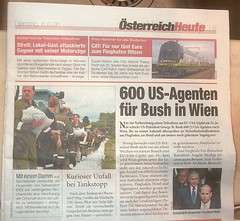John Hostettler, chairman of the House of Representatives subcommittee on immigration and border security, said on Thursday that Canada "hosts an abundance of terrorists and as many as 50 terrorist organizations".
This provoked an angry response from Canada's government and the main Liberal opposition party, referring to them as "completely uninformed and ignorant remarks."
Given the arrest by Canadian police of 17 suspected terrorists, they may well be justified in the strength of their response, if one compares the success of the RCMP and CSIS (Canadian Security and Intelligence Service) with the work of the FBI and CIA in detecting and disrupting terrorist cells.
It seems this may be a political ploy to impose greater restrictions on Canadian citizens visiting the US, and probably greater restrictions on US citizens returning from Canada.
Hostettler's comments alarmed Canadian politicians, who are trying to persuade U.S. lawmakers to delay a law that would require all Canadian citizens crossing into the United States to carry a passport or a sophisticated identity card. Canadian and U.S. communities along the border fear the rules -- due to come into effect on Jan. 1, 2008 -- could damage a lucrative cross-border trade.And indeed they do; Canada has always preferred dialogue and diplomacy to blowing people up, and has been a strong opponent to the War in Iraq while quietly participating in Afghanistan and in general being on board in terms of counterterrorism without prosecuting it as a "war." Canada views domestic terrorism (and planning to commit terror in other nations) to be a very serious crime - with very long sentences in very secure prisons, after due process.
Hostettler said he opposed the idea of a delay, saying: "We do not want to have to worry about a neighbor that has a very different attitude than we do about terrorism"
It's very possible that part of the current disagreement is a bland Canadian rejection of overtures from the US to "remand" the suspects to the tender mercies of the CIA in some undisclosed location in, say, Romania. Even terrorist suspects still have civil rights - in Canada.
One thing is clear; Canada and Canadians have been deeply offended by this and many similar statements and actions by the US, and while the trade ties between the US and Canada are deep and long-standing, it is a matter of fact that Canada has no impediment to seeking a wider selection of trade partners - many of which are not particularly friendly to US interests.
The list of Canadian trade partners - just off the top of my head - includes China, and the Pacific Rim nations in general, strong relations with both India and Pakistan, good relationships with Cuba and the rest of the Caribbean nations, and very significant involvement with various member nations in the Russian Federation, revolving around oil and resource extraction in general.
The US has long depended upon Canada to be the "good cop" in international relations, and now the good cop isn't particularly invested in supporting US foreign policy.
This is not good news for an increasingly isolated United States faced with the possibility of having to defend it's indefensible borders and coastline against penetration by a hoard of illegal immigrants and potential terrorists.
Mexico sees little percentage in reacting favorably to US security concerns, seeing them as being in large part the fruit of fifty or more years of abusive practices toward Mexico, Central and South America. Furthermore, their economy depends on border porosity, illegal migration and the drug trade.
But the US could once rely on Canada as being a swift and responsive partner in matters of continental security. But with a large Muslim population of it's own, it may well be that Canada sees little percentage in radicalizing a large sector of it's own population in order to appease a Bushist foreign policy that is frankly offensive to Canadian sensibilities.
You may well hear rumblings from the Right about annexing Canada as a means of securing the US. I assure you, this is an old chestnut that surfaces periodically. Any sane and sufficiently paranoid military commander would tell you what a very very bad idea that was, even if they had not been leaked a copy of the latest Canadian defense plans. Leaking such plans is an important part of Canada's relationship with the US, along with wry observations as to what happens to American tanks in northern Canada.
Canada is a NATO member and a Commonwealth member, which could bring in England, Australia, India, possibly Pakistan and quite possibly Russia.
Combine this potential alliance with a possible coalition of South-American and Mexican forces, stack that against the total number of available forces on American soil, and you have what might be kindly referred to as "the nightmare scenario" - a war on two fronts, with sea blockades by at least one, possibly two nuclear powers. Three, if France were to participate.
Inconceivable? Certainly unlikely, even now. But world opinion increasingly regards the US as a rogue state - and the south and Central American nations have long regarded it as such, given it's constant interference in their affairs. It would not take as much as many Americans think to generate an alliance of forces that would have, if nothing else, a startling advantage in sheer numbers, and with it's own, quite competent arsenal nations - Argentina and Brazil.
An attempt to annex Canada by military force would present a golden opportunity, strategically and politically, for such a grand alliance. And the prize - the riches of the American Southwest - California, Texas, Louisiana and of course all the Caribbean islands.
Nor would there be a lack of domestic support for such invasions, any more than one could expect anything like universal support for the invasion of Canada. Widespread domestic insurgency would be a given and I would expect the situation to collapse into a series of regional struggles.
The end result? No more United States, to the general approval of the rest of the world, and many regions of the former US.
This is not a future vision I view with much approval, but it seems increasingly likely given current policies, and should those policies continue beyond 2008, you can put me down for a fiver that the US will not exist as a nation in it's present form beyond 2012.
tag: politics, dangerous president, oil war, unitary executive, commander in chief, Canada, foreign policy, terrorism, domestic terrorism

